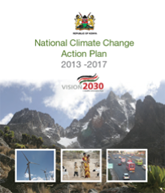Embu County Stakeholders Consultative Workshop
The workshop was convened as part of the work plan for the development of the National Climate Change Response Strategy’s Action Plan. The overall objective of the consultations is to provide an opportunity for stakeholders from each of the counties to prioritise climate change concerns and required actions to inform the Action Plan.
The following are some of the socio-economic and geographic characteristics of the seven counties (Embu, Isiolo, Kitui, Machakos, Makueni, Marsabit, Meru, and Tharaka-Nithi) represented in the workshop: all the eight counties are in different agro-ecological zones (AEZs) with Embu, Meru and Tharaka Nithi being classified in Zone II (agriculturally productive), while Kitui, Makueni and larger parts of Machakos are semi-arid, while Marsabit is arid. The main economic activities in these counties therefore also vary in accordance with the agro-ecological zones in which they are found. In Embu, Meru and Tharaka-Nithi, crop cultivation is the main activity, Kitui, Makueni and Machakos are characterised by agro-pastoralism, while in Isiolo and Marsabit, pastoralism dominates.
NCCAP Reports
National Climate Change Action Plan Executive Summary
Long-Term National Low Carbon Climate Resilient Pathway
Adaptation, Analysis and Prioritisation
Enabling Policy and Regulatory Framework
National Performance and Benefit Measurement







